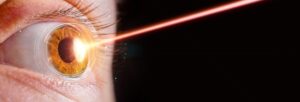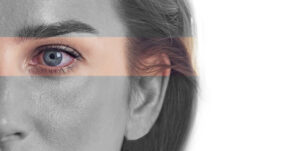
Red, itchy, watery and swollen eyes are all symptoms of eye allergies, also known medically as allergic conjunctivitis. These common ailments, along with their even more common cousins, runny noses and scratchy throats, are experienced by upwards of fifty million allergy sufferers in the United States seasonally, and that number is only increasing.
Understanding the causes of these allergic reactions may help in deterring their annoying and sometimes debilitating effect, and the following contains information on what you need to know about eye allergies, including some helpful hints on how to get rid of your immediate symptoms.
What causes an eye allergy?
Eye allergies are caused by normally harmless substances called allergens that react in individuals who are predisposed to an allergic response. Of these airborne allergens, the most common are dust, pet dander, mold and pollen. Also to blame for eye allergies are certain cosmetics and eye drops that cause reactions in some people, which can be ironic since their primary purpose is to relieve dry eyes.
There are a few options to consider when it comes to alleviating the itchy, watery eyes caused by eye allergies. The first, while basic, is also the most effective: AVOID EXPOSURE TO ALLERGENS.
Remaining indoors on days when the pollen count is high, avoiding animals when aware of an allergy to pet dander, and using a high-quality air filtration unit in the home are all ways to limit exposure to the most common causes of eye allergies. When going outside, use wraparound lenses and travel in the car with the windows up.
If you know a home or area you are going to has an animal or environmental allergy that stimulated eye irritation for you, use preventative measures such as eye drops that are prescribed specifically for allergies or use an over the counter eye drop for allergies.
Likewise, you may want to talk to a physician if you have recurring allergy irritation due to prolonged exposure to a substance or dander that is irritating for your immune system.

Are contacts the problem?
Another simple way to counteract eye allergies is to remove contact lenses during allergy season. These can trap unwanted allergens in direct contact with the eyes, increasing irritation and severity of symptoms. Consider using only eyeglasses during seasons when the pollen count in particularly high.
If the allergy symptoms are mild to moderate, over the counter eye drops may be sufficient to relieve the discomfort caused by eye allergies. Use these first to determine if a more potent (and expensive) alternative is necessary.
For those suffering from more severe symptoms, a doctor’s prescription may be necessary.
These prescription eye drops and oral medications can take various forms, including:
- Antihistamines. Part of the bodies natural defense system against allergens is the release of histamine into the bloodstream, causing symptoms such as a runny nose, watery eyes and scratchy throat. Antihistamines work by reducing the number of histamines released into the body.
- Decongestants reduce the size of swollen nasal passages, allowing for easier breathing and relief from blocked sinuses. They also relieve red eyes by shrinking swollen blood vessels in the eyes.
- Non-steroidal anti-inflammatory drugs (NSAID) eye drops may be prescribed to alleviate symptoms of hay fever.
If you found this article helpful and are suffering from painful eye allergies, need a checkup or simply want to hear more information about an eye condition from a qualified doctor, call Diamond Vision today to schedule an appointment or consultation. Contact our Atlanta Eye Health Clinic, if you are in Georgia.
Contact Us
If you have more questions about LASIK procedures, get in touch with us.
Related Blogs

Who Should Not Have Laser Eye Surgery
Laser eye surgery, commonly known as LASIK (Laser-Assisted In Situ Keratomileusis), has revolutionized the world of vision correction. It’s a procedure that has enabled millions

LASIK eye surgery: What is LASIK and how does it work?
What Is LASIK? Experts categorize LASIK as a refractive eye surgery in which lasers are used to correct vision problems. LASIK corrects several refractive errors,

Everything You Need To Know About The Lipiflow Treatment
LipiFlow is often referred to as a ground-breaking technology that is able to treat dry eye issues caused by meibomian gland dysfunction, or MGD. Experts
